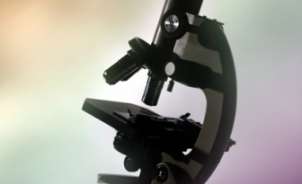Treatment in HIV-infected infants may reduce virus to undetectable levels, but still too soon to say cure

(Medical Xpress)—In a Canadian research collaboration, clinicians and scientists at The Hospital for Sick Children (SickKids), Children's Hospital of Eastern Ontario (CHEO), Sainte-Justine University Hospital Research Center (CHU Sainte-Justine), and Université de Montréal teamed up to investigate the impact of treating newborns, whose mothers did not have full suppression of their HIV during pregnancy, with combination antiretroviral therapy within 72 hours of birth.
The study, published in the June 9 online edition of Clinical Infectious Diseases, was initiated after news in March 2013 reported that an HIV-infected infant in Mississippi, who had been on the same early combination treatment, had been apparently cured of the virus.
The study found that in some HIV-infected children, starting antiretroviral treatment soon after birth reduced the size of HIV reservoir in the blood to undetectable levels. The research team cautions however that it is too soon to know whether these children have been functionally cured.
The research team reviewed the charts of 136 children who received treatment doses of combination antiretroviral therapy within 72 hours of birth. Of these, 12 children were confirmed to be infected with HIV. Eight of the 12 had ongoing evidence of active infection based on detection of the virus in standard viral load blood tests. All of these eight children had a history of incomplete adherence to therapy at some time during follow up. The remaining four children, all very adherent to therapy, achieved and have maintained an undetectable viral load for three to seven years. These four had a series of highly sensitive tests done in an attempt to detect latent virus in blood cells. In three of the four, no latent virus could be detected. In the fourth, virus was cultured from blood cells at an extremely low level (0.1 infectious units per million cells).
The findings of the study have several important implications pertinent to the management of newborn infants at high risk of HIV infection. "Our findings suggest that starting combination treatment within 72 hours of birth may significantly reduce the amount of HIV in the body," says Dr. Ari Bitnun, lead author of the study and Physician in Infectious Diseases at SickKids. "However, stopping treatment may be the only way to determine whether these patients have in fact been cured." This is because the virus may be present in latent form within a very small number of cells that cannot be detected even with the most sensitive tests available. The team is unanimous that more investigation is needed before considering stopping treatment. If viable latent virus is present, even in minute amounts, it is likely to reactivate after stopping treatment and this could be harmful to the long-term health of these children.
The findings of the study also have implications for HIV cure research in perinatally-infected children, demonstrating that early initiation of treatment may be the key to reducing the virus to virtually nothing. This observation extends the findings of previously published studies involving both adults and children that showed that starting treatment within months of infection is associated with lower levels of latent virus in cells compared to those who begin treatment later.
Another important finding was that all three children, in whom no virus was detected, had genetic markers that were previously associated with better HIV control in adults. "This suggests that in early treated perinatally-infected children, the infant's genetic make-up may contribute to how well HIV can be controlled," says Dr. Hugo Soudeyns, Researcher at CHU Sainte-Justine and Chair of the Department of Microbiology, Infectiology and Immunology at Université de Montréal.
"What is very important for the families of children living with HIV to remember is that this research, while very exciting, is still in its early stages and any talk of a cure for HIV is premature," cautioned Dr. Jason Brophy, staff physician at the Children's Hospital of Eastern Ontario and principle Knowledge User for the team. "We would not want families to become so excited about these findings that they stop their child's medications without consulting their physician. We hope to provide clear information to the community affected by HIV at every step of the way on this path of paediatric HIV cure research."
While this study presents new implications for further research into a cure for HIV-infected infants, the team emphasizes the importance of preventing HIV-transmission from mother to baby by ensuring that all pregnant women are tested for HIV. "If appropriate treatment is provided during pregnancy and delivery, we can virtually eliminate the risk of transmission from mother to child which would eliminate the need to aggressively treat newborn infants with combination antiretroviral treatment in the first place," says Bitnun and the team.
More information: Ari Bitnun, Lindy Samson, Tae-Wook Chun, Fatima Kakkar, Jason Brophy, Danielle Murray, Shawn Justement, Hugo Soudeyns, Mario Ostrowski, Shariq Mujib, Richard Harrigan, John Kim, Paul Sandstrom, and Stanley E. Read. "HIV/AIDS: Early Initiation of Combination Antiretroviral Therapy in HIV-1-Infected Newborn Infants can Achieve Sustained Virologic Suppression with Low Frequency of CD4+ T-cells carrying HIV in Peripheral Blood." Clin Infect Dis. first published online June 9, 2014 DOI: 10.1093/cid/ciu432


















